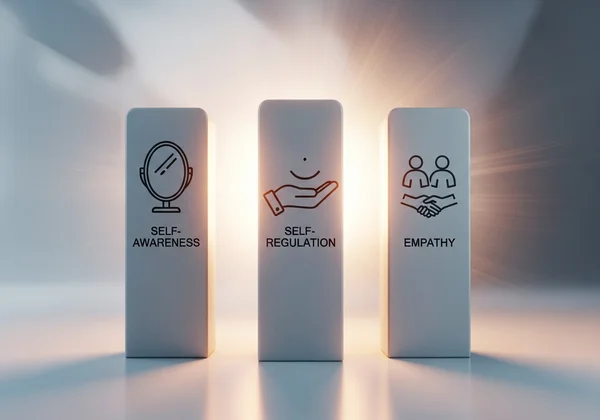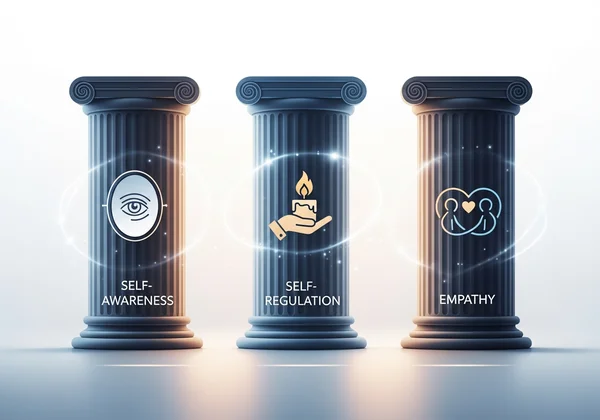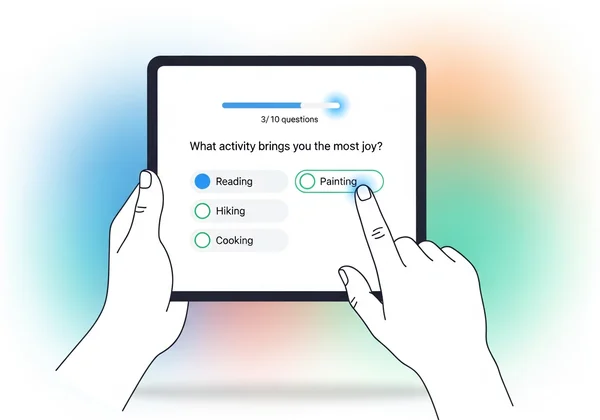Emotional Maturity & Your Mental Age: Take a Free Quiz to Grow Your Inner Self
November 13, 2025 | By Chloe Griffith
Have you ever felt that your reactions didn't quite match the situation, or perhaps felt a sense of pride in how calmly you handled a crisis? This dance between our feelings and our actions is the essence of emotional maturity. It’s a quality that has little to do with your chronological age and everything to do with your inner wisdom. It’s the invisible force that shapes our relationships, careers, and overall well-being. But what is emotional maturity, really? Let's unwrap that mystery!

Diving into your emotional landscape is a profound step in personal growth. It’s about more than just knowing you feel happy or sad; it’s about understanding the why behind those feelings and navigating them with grace. This journey of self-discovery can be both enlightening and empowering. If you're curious about where you stand, a great starting point can be a fun and insightful emotional maturity test designed to explore these very aspects of your inner world.
What is Emotional Maturity, and How Does it Relate to Your Mental Age?
Emotional maturity is the ability to understand, manage, and express your emotions in a healthy and constructive way. It’s not about suppressing feelings but about responding to them thoughtfully rather than reacting impulsively. Think of it as the emotional equivalent of being a wise adult—someone who can face life's ups and downs without being thrown completely off balance. This quality is crucial, as it's the invisible hand guiding how we build relationships, cope with stress, and make decisions, forming the bedrock of a resilient and fulfilling life.
Beyond Age: The True Definition of Emotional Maturity
We all know 40-year-olds who might react like teenagers and teenagers who possess a wisdom far beyond their years. This proves that true maturity isn't marked by birthdays. Instead, it’s defined by your ability to process your internal world and interact with the external world effectively. It involves a deep understanding of your emotional triggers and patterns, allowing you to choose your responses with intention.
The Core Pillars: Self-Awareness, Regulation, and Empathy
Emotional maturity rests on three fundamental pillars:
- Self-Awareness: The ability to recognize and understand your own moods, emotions, and drives, as well as their effect on others.
- Self-Regulation: The capacity to control or redirect disruptive impulses and moods. It's about thinking before you act.
- Empathy: The skill of understanding the emotional makeup of other people and treating them according to their emotional reactions.
Mastering these pillars is a continuous journey, one that starts with curiosity and a desire to better understand yourself.

12 Clear Signs You're Developing Emotional Maturity
Recognizing the signs of emotional maturity in yourself is a powerful affirmation of your personal growth. These aren't checkboxes to tick off, but rather behaviors and mindsets that blossom over time. How many of these resonate with you?
Mastering Your Inner World: Self-Regulation and Resilience
- You Pause Before Reacting: Instead of an immediate emotional outburst, you take a breath and consider the situation before responding.
- You Handle Disappointment Gracefully: You see setbacks as temporary and as opportunities to learn, rather than as personal failures.
- You Can Self-Soothe: You have healthy coping mechanisms to manage stress, anxiety, or sadness without relying on external validation or distractions.
- You Take Responsibility: You own your mistakes and apologize sincerely without making excuses or blaming others.
Navigating Relationships: Empathy, Communication, and Boundaries
- You Listen to Understand, Not Just to Reply: You engage in active listening, showing genuine curiosity about others' perspectives.
- You Set Healthy Boundaries: You can say "no" respectfully and protect your energy without feeling guilty.
- You Can Disagree Respectfully: You understand that others can have different opinions and you can debate ideas without attacking the person.
- You Celebrate Others' Success: You feel genuine happiness for others' achievements, free from envy or comparison.
Embracing Growth: Adaptability, Accountability, and Perspective
- You Are Open to Feedback: You view constructive criticism as a gift for growth, not a personal attack.
- You Are Flexible and Adaptable: When plans change, you can pivot without significant frustration, embracing the new direction.
- You See the Bigger Picture: You can step back from minor annoyances and maintain perspective on what truly matters in life.
- You Are a Lifelong Learner: You remain curious and understand that there is always more to learn about yourself and the world. An easy way to learn more is to take our free quiz.
Common Challenges in Emotional Development
The path to emotional maturity is rarely a straight line; it's filled with twists, turns, and the occasional roadblock. Acknowledging these challenges is the first step toward overcoming them. Many of us struggle because we were never explicitly taught how to manage our complex inner worlds.
Identifying Emotional Roadblocks: What Holds Us Back?
Common hurdles include unresolved past experiences, ingrained defense mechanisms, and a fear of vulnerability. Sometimes, the very patterns that helped us survive difficult situations in the past become the cages that limit our growth in the present. Recognizing these patterns is crucial. Are you quick to anger to avoid feeling hurt? Do you use humor to deflect from serious conversations? These are valuable clues on your journey to discover your inner age.
The Impact of Unmet Emotional Needs
When our core emotional needs—for safety, connection, and validation—are not met, especially in childhood, it can stunt our emotional development. This can manifest as insecurity, neediness in relationships, or an inability to trust others. The good news is that as adults, we have the power to learn how to meet these needs for ourselves and build a more secure emotional foundation.
How to Cultivate Emotional Maturity: Actionable Strategies
Becoming more emotionally mature is an active process. It requires intention, practice, and patience. Here are some concrete strategies you can start implementing today to nurture your emotional growth.

Practice Mindful Reflection and Self-Compassion
Set aside a few minutes each day to check in with yourself. Ask: "What am I feeling right now, and why?" Journaling is an excellent tool for this. Instead of judging your feelings, treat yourself with the same kindness and compassion you would offer a good friend. This practice builds the crucial pillar of self-awareness.
Enhance Communication and Active Listening Skills
In your next conversation, make a conscious effort to truly listen. Put your phone away, make eye contact, and try to understand the speaker's perspective before formulating your response. Practice expressing your own needs and feelings using "I" statements, such as "I feel hurt when..." instead of "You always make me feel..."
Embrace Constructive Feedback and Continuous Learning
Ready for a growth spurt? Actively seek feedback from people you trust. When you receive it, thank them and reflect on the information without becoming defensive. Read books, listen to podcasts, and explore resources on emotional intelligence and personal growth. Your journey can be fun and insightful; why not start your journey with a simple quiz?
Your Journey to a Richer Emotional Life Starts Now

Emotional maturity is not a final destination but a lifelong journey of becoming a more aware, compassionate, and resilient version of yourself. Every step you take to understand your emotions is a step toward a more authentic and fulfilling life. It enhances your relationships, improves your decision-making, and equips you to handle whatever life throws your way with greater wisdom and peace.
Remember, this is a path of self-discovery, not self-judgment. Be patient and celebrate the small victories. If you're ready to take a fun, illuminating first step on this path, we invite you to explore your mental age. Our free Mental Age Test is designed to give you a playful yet insightful glimpse into your cognitive and emotional world.
Disclaimer: This test is intended for entertainment and self-reflection purposes only and is not a substitute for professional psychological advice or clinical diagnosis.
Frequently Asked Questions About Emotional Maturity
Is emotional maturity the same as having a high mental age?
That's a great question! While they are related, they aren't exactly the same. Your mental age often reflects your cognitive style, preferences, and ways of thinking. Emotional maturity is more specifically about how you process and manage your feelings. However, a high level of emotional maturity is often a characteristic found in those with a higher "mental age." Taking a mental age quiz can be a fun way to see how these different aspects of you align.
Can adults still develop their emotional maturity?
Absolutely! Our brains have an amazing capacity for change and growth throughout our lives, a concept known as neuroplasticity. Emotional maturity is a skill set, and like any skill, it can be learned and strengthened with conscious effort and practice at any age. It's never too late to start.
How can I quickly assess my current emotional maturity level?
Self-assessment is a great start. Reviewing the "12 Signs" in this article and honestly reflecting on which ones you embody is a powerful exercise. For a more interactive and structured approach, an online tool like a free mental age test can provide a snapshot of your tendencies and preferences, offering valuable insights into your emotional patterns.
What's the biggest challenge in becoming more emotionally mature?
One of the biggest challenges is unlearning old, automatic habits. Our ingrained emotional reactions can be deeply rooted and operate on autopilot. Overcoming this requires consistent self-awareness and the courage to choose a different, more thoughtful response in the heat of the moment. It takes practice, but every conscious choice builds the new neural pathways for a more mature you.